Coverage of Hunter Biden story illustrates extremes in media polarization
Far-right amplification of potential influence op
Coverage of Hunter Biden story illustrates extremes in media polarization
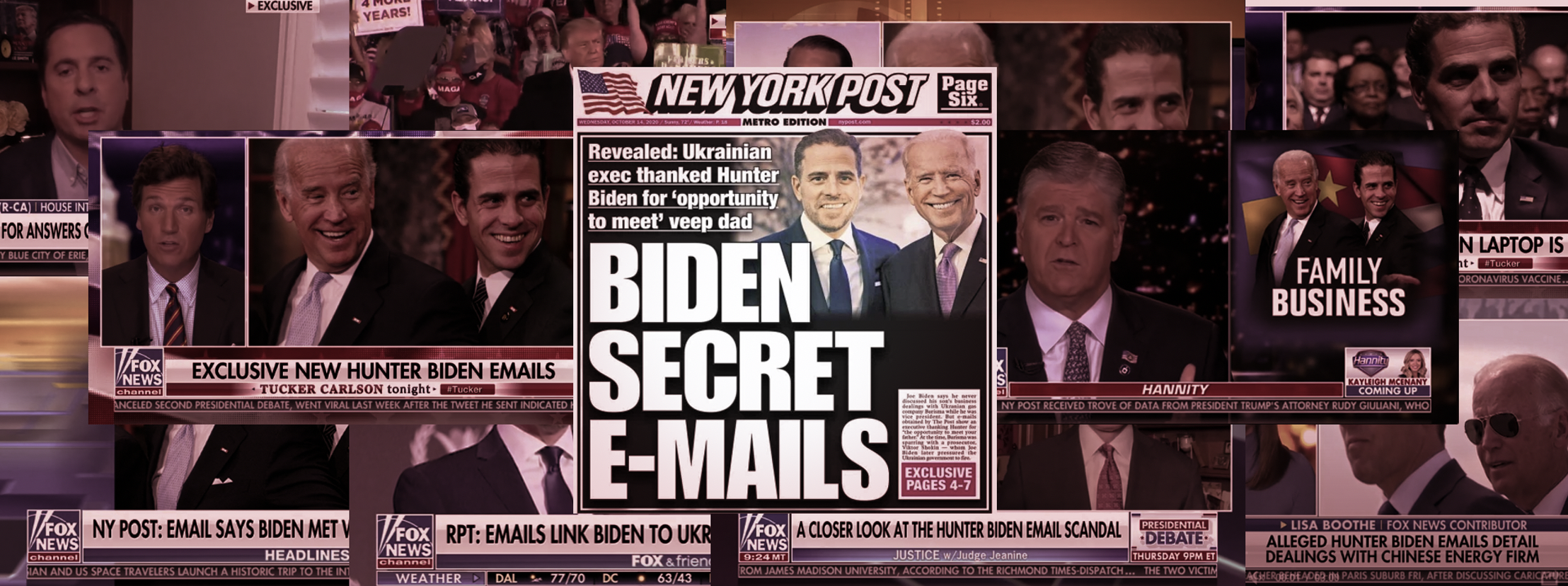
Far-right amplification of potential influence op echoes that of Wikileaks coverage in 2016
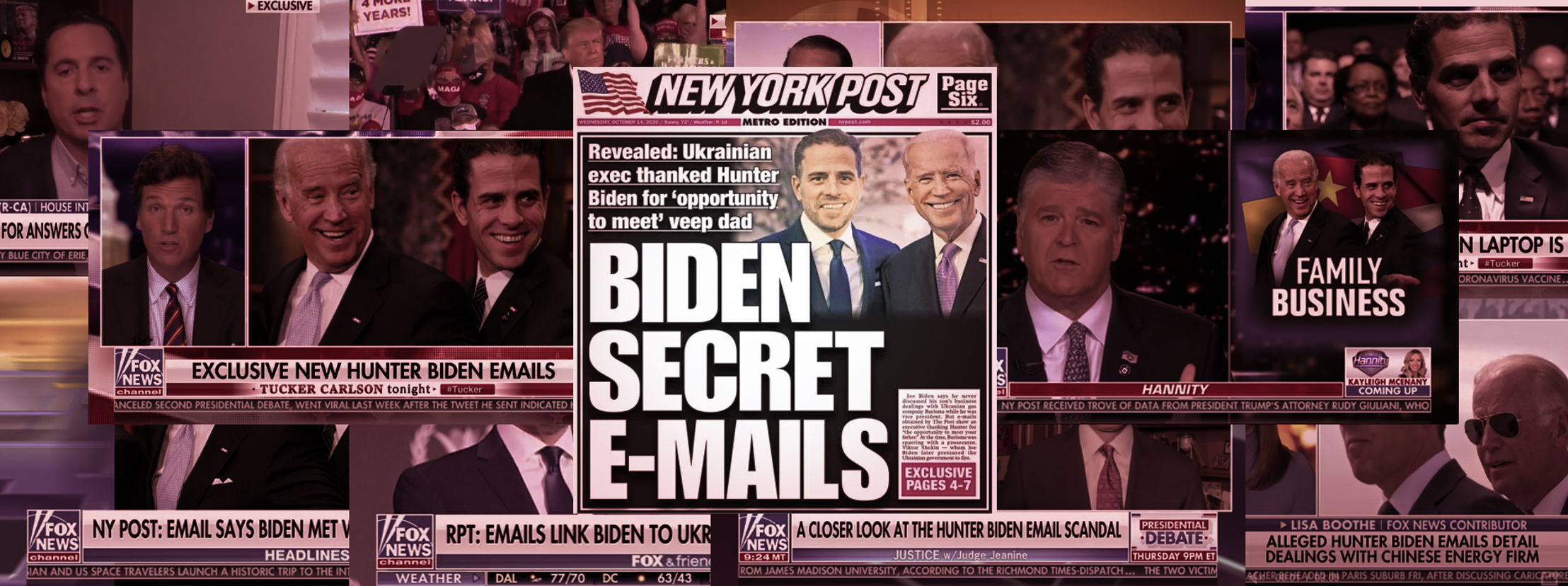
On October 14, 2020, the New York Post published leaked emails and videos purportedly retrieved from the hard drive of a laptop owned by Hunter Biden, the son of former Vice President Joe Biden. This was the “October Surprise” that had been previewed on Dutch public television by Steve Bannon, former White House chief strategist, and warned about by U.S. intelligence analysts, who feared a potential Russian hack-and-release operation in the final weeks of the election. The result has been an explosive media event, reminiscent of Wikileaks in 2016, which has demonstrated a sharp divergence in how mainstream and far-right media choose to cover a potential foreign interference campaign.
The New York Post emails show Hunter Biden engaged in lobbying activities on behalf of the Ukrainian natural gas producer Burisma Holdings, where he was a board member from 2014 to 2019. They also show a previously undisclosed 2015 episode in which a Burisma executive sought a meeting with then-Vice President Biden (the Biden campaign confirmed this meeting never took place). The leaked emails went immediately viral, cited by supporters of President Trump’s re-election campaign as proof that his opponent was corrupt.
Meanwhile, numerous national security professionals have cast doubt on the origin of the leaks. Shortly after publication of the Post story, it was revealed that Rudy Giuliani, chief promoter of the leaked emails and President Trump’s personal lawyer, had been repeatedly targeted by Russian intelligence for the purposes of laundering disinformation. The FBI quickly launched an investigation. On October 19, more than 50 former U.S. intelligence officials signed a letter stating that the email dump “has all the classic earmarks of a Russian information operation.”
Wikileaks 2020?
Comparisons to Wikileaks are inevitable. Then, as now, a political opponent of Trump has been the subject of a calculated email leak in the final weeks before the election. Then, as now, the proxy for the leaks is a suspected Russian asset. It was telling when both Twitter and Facebook — which have prepared extensively for a “Wikileaks redux” — sharply limited the spread of the Post story within hours of release, citing concerns about viral disinformation. This temporary censorship sparked outrage among conservative politicians and further fueled the spread of the emails in far-right networks.
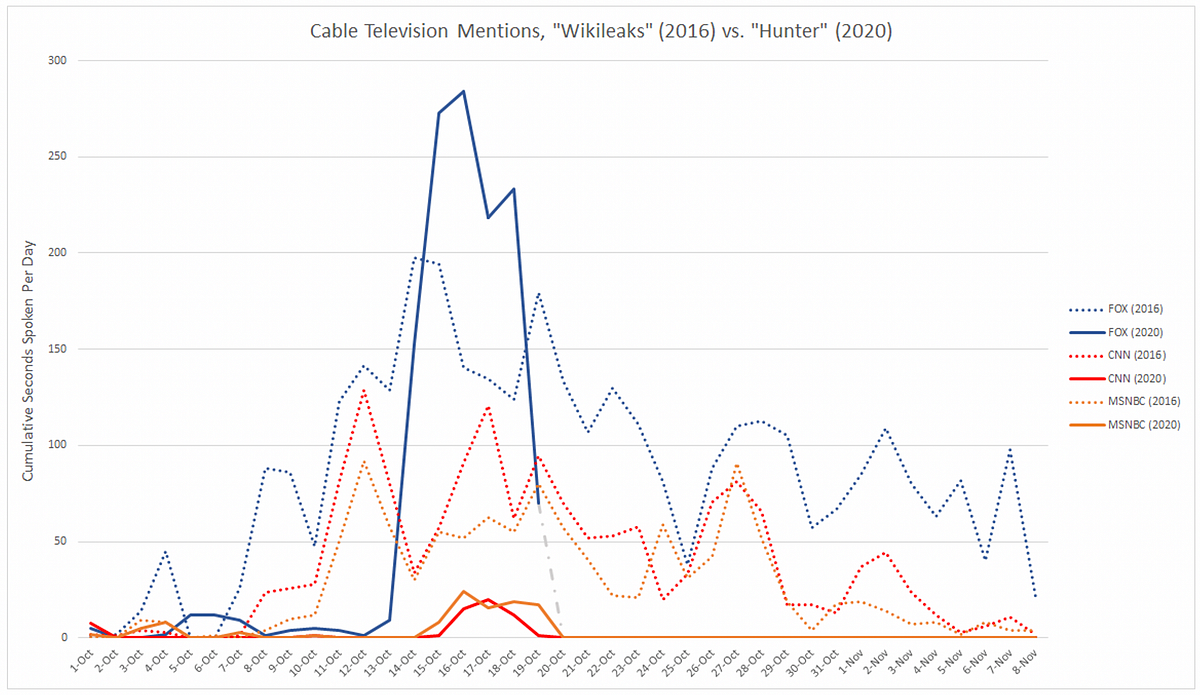
Yet while the conditions of the New York Post story and Wikileaks are similar, there are sharp differences in how the stories have been featured in broadcast media. According to a scan of cable television transcripts using the Stanford Cable TV News Analyzer, the Wikileaks disclosures were covered roughly equally by CNN and MSNBC following the first major release on October 7, 2016. The disclosures were covered significantly more by Fox News. All three cable broadcasters featured Wikileaks as a regular part of their programming through election day.
By contrast, CNN and MNSBC dedicated very little airtime to the Hunter Biden emails following the October 14, 2020 release. Fox News, however, has run ongoing coverage of the documents and purported revelations. More striking still, Fox News appears to have devoted significantly more airtime to the first six days of the Post story than it did to the first six days of the Wikileaks disclosures. Just one day after the release of the Hunter Biden record, Fox News eclipsed its one-day coverage record for the Wikileaks scandal.
Hunter Biden emails see overwhelmingly partisan amplification
Among the 1,000 most popular Hunter Biden-related articles shared between October 14 and October 20, 28 million shares belonged to right-leaning web publications, accounting for 85 percent of the total. Determination of “Skews Left,” “Balanced,” and “Skews Right” publication categories are based on Version 5.1 of the Media Bias Chart by ad fontes media. Via BuzzSumo search, the DFRLab identified 1,000 most-shared “antifa”-related articles. A total of 69 outlets were determined to be “Balanced” or “Skews Left” and were subsequently excluded from the “Skews Right” query. Unrated outlets were included in the “Skews Right” query, as they almost universally echoed or exaggerated other “Skews Right” headlines.
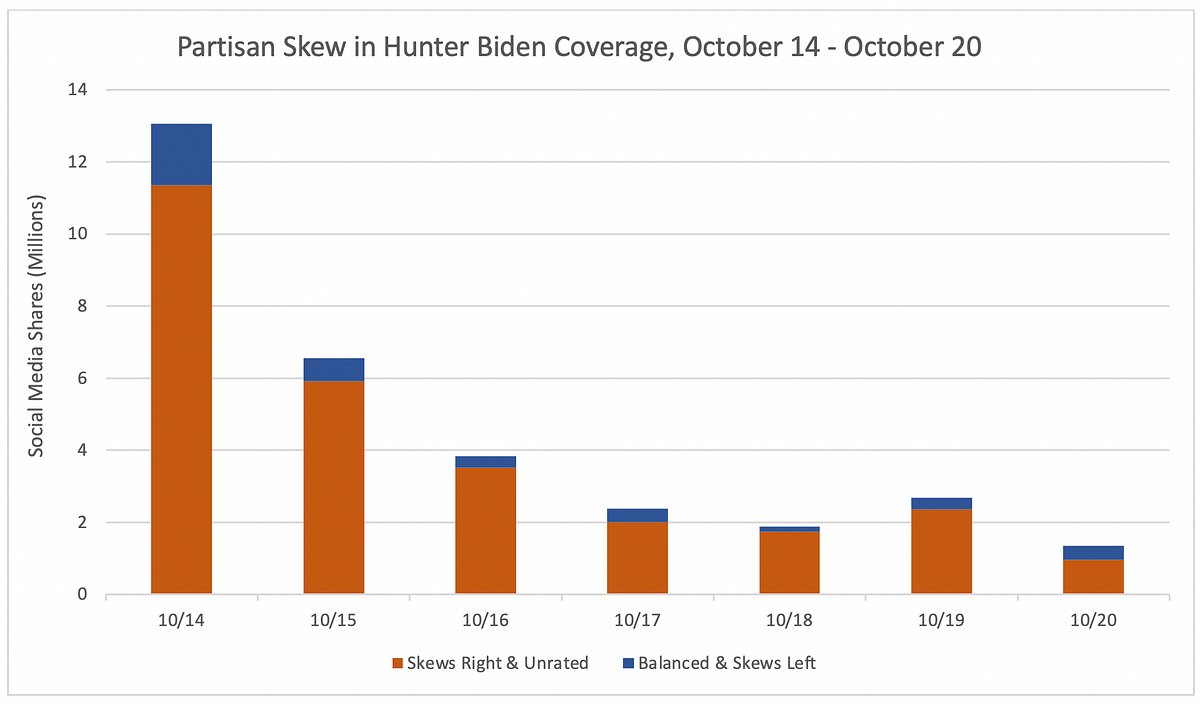
Additionally, an analysis of the five most popular Hunter Biden-related articles spread across social media comprised roughly 4 million shares between them. The two stories with the highest engagement originated from the New York Post, while the next two highest-engaged stories were published by Fox Business and Fox News, respectively. The Washington Times held the spot for the fifth most-engaged story.
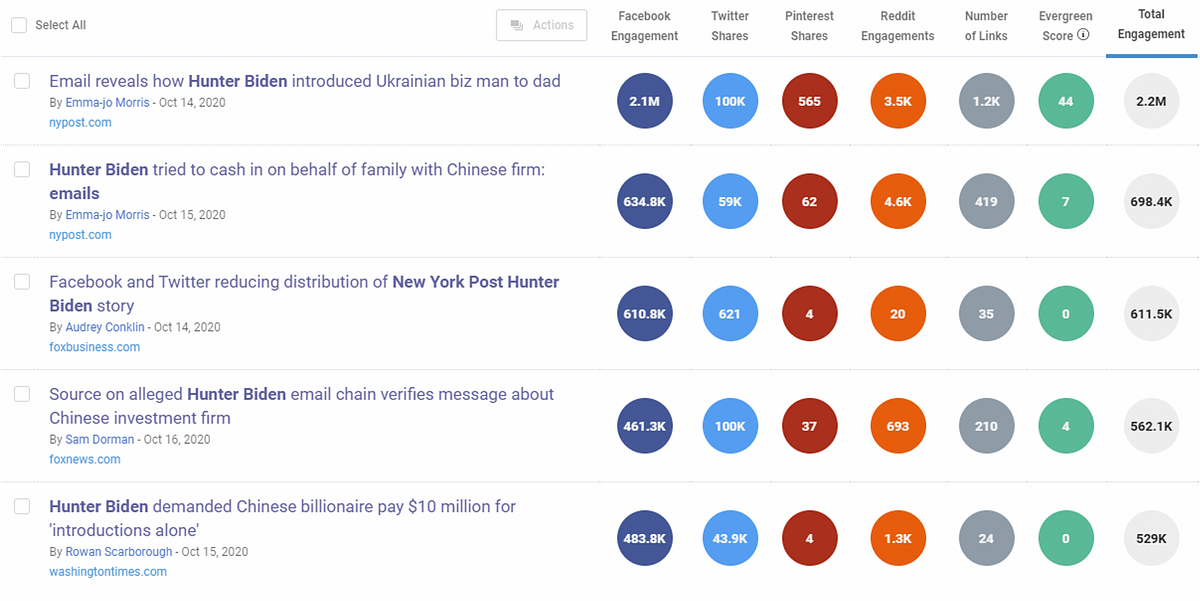
This disproportionate partisan coverage is also evident in the dominance of far-right outlets regarding articles about the leaked emails. Between October 14–18, the 1,000 most popular Hunter Biden-related articles received roughly 33 million shares across Facebook, Twitter, Pinterest, and Reddit. Approximately 28 million of these shares — 85 percent of the total — were reserved for adamantly pro-Trump websites that frequently used salacious headlines and presented decontextualized or incomplete information.
Such a stark divide in attention is highly unusual. It means that social media conversation regarding the Hunter Biden emails is appreciably more one-sided than even the skewed coverage of “antifa” during the George Floyd protests in June 2020. No other recent major U.S. political event comes close to this level of polarization.
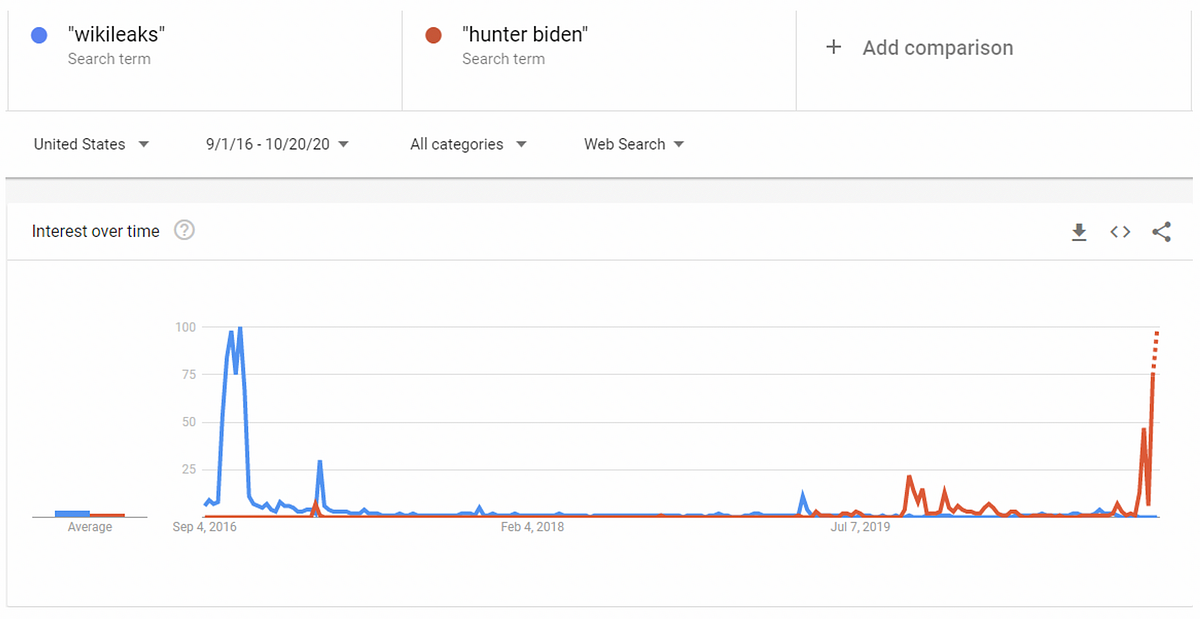
In 2016, Wikileaks had a seismic impact on the election by reaching two separate audiences: far-right partisans, who used the hacked emails as the basis for a broader political mythos, and undecided American voters, who grew to distrust then-presidential candidate Hillary Clinton as Wikileaks continued to be featured regularly by nonpartisan and left-leaning media outlets.
While the digital footprint of the Hunter Biden emails appears roughly similar, it is clear that these leaks are not reaching the same audience. Few undecided voters will be drawn to the Post story unless they already consume far-right television and websites on a regular basis. On the other hand, political partisans have embraced the story with a passion and fury that was uncommon even four years ago.
Conclusion
The same day that the Hunter Biden emails were published, the Election Coverage and Democracy Network published its “Recommendations for Media Covering the 2020 U.S. Presidential Election,” co-signed by 69 professors of journalism and public policy. The first recommendation was to deny a platform to anyone making unfounded claims — to carefully assess stories for their potential to have “negative consequences for free and fair elections.” The obvious point of reference were Wikileaks disclosures in 2016, which were widely amplified by reporters despite serious questions about the origin and veracity of the information.
Based on an early review of broadcast television and article share data, it appears that the nonpartisan and left-leaning press has taken this lesson to heart regarding the Hunter Biden emails, drastically reducing their coverage of these yet-unverified claims. The result is a far more one-sided Wikileaks — and a new cause for conspiratorialism among the American far-right, who will feel that their “October Surprise” has been ignored.
Emerson T. Brooking is a Resident Fellow with the Digital Forensic Research Lab.
Follow along for more in-depth analysis from our #DigitalSherlocks.
Editor’s note: The Atlantic Council received funding from Burisma in 2017, 2018, and 2019. The DFRLab did not receive any portion of these funds and retains strict independence in monitoring and reporting. Further, all financial support for the Council’s programs and centers is conditional on acceptance of the Council’s intellectual independence policies.

